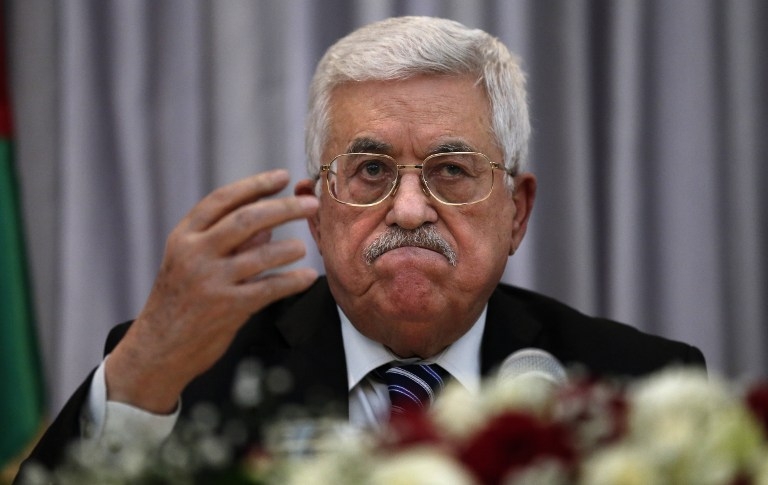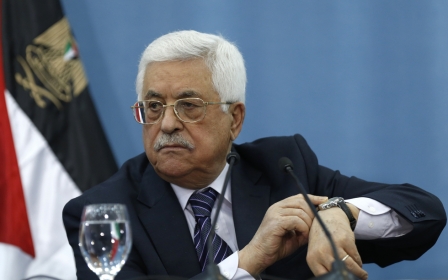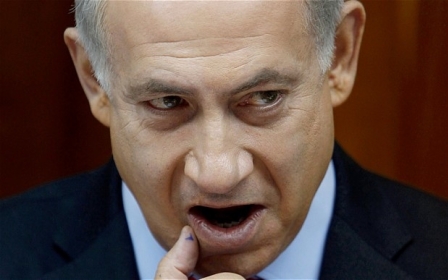Abbas cracks down on rival groups as Palestinians call for his resignation

BETHLEHEM, West Bank – As violence continues in the Occupied Palestinian Territories, tensions within the Palestinian Liberation Organisation (PLO) appear to be rising, with critics accusing Palestinian President Mahmoud Abbas of increasingly trying to weaken and silence opponents.
The Popular Front for the Liberation of Palestine (PFLP), a socialist movement and the second-largest faction in the PLO has been at the heart of the growing controversy.
Since the latest upswing in violence began in October, the PFLP has become one of the most vocal factions to challenge Abbas's stumbling administration. The group has been highly critical of the government, accusing it of not supporting the people’s uprising.
The PLO encompasses several Palestinian factions, but Abbas's Fatah movement is by far the most prominent.
Last week the PLO stopped funds that should legally be funneled to its various members, increasing tensions that have been growing for months.
The PFLP was quick to go on the offensive, saying the move was a response to their criticism of Abbas.
A day after the announcement, PFLP members burned photos of Abbas during a protest in Gaza City. Hani al-Thawabta, a leader of the PFLP in the Gaza Strip and member of the PFLP’s central committee, told Middle East Eye that Abbas’s actions were an attempt to turn the PLO into “a weapon to acquire power”, by pushing out anyone who disagrees with his positions.
PLO cuts funding to affiliated groups
While the PFLP has been on shaky terms with the Palestinian establishment, which has cut funding to the group a number of times during the past several years, al-Thawabta said relations between the PFLP and Abbas had deteriorated even further during the most recent bout of uprising.
Mohammed Brijiya, a PFLP spokesperson in the occupied West Bank said the PLO told the PFLP that its funding cut was due to financial constraints gripping the body, although his group had rejected their excuses.
Local media have since also reported that the PLO had cut funds to the Democratic Front for the Liberation of Palestine (DFLP), another leftist group with ties to the PFLP.
The PLO has strongly denied this, with a senior official in the PLO telling MEE that the decision was not political and would be rectified “soon” – but the controversy has refused to go away, with Abbas’s support continuing to fall away even in more traditional quarters.
Abbas' unpopularity
According to a recent poll by the Palestinian Center for Policy and Survey Research (PCPSR), 64 percent of the Palestinian public in the occupied West Bank and Gaza Strip want Abbas to resign – a majority that has risen slightly since the poll first started asking the question after Abbas announced plans to resign from the PLO’s executive committee in August.
Abbas’s handling of the current crisis has played a key part in his unpopularity. While the PCPSR’s poll showed that the majority of the Palestinian public supported the uprising, Abbas and other PA ministers have told media on several occasions that the Abbas administration has been working hard to quell the unrest.
In contrast, the PFLP, DFLP, Islamic Jihad, the Hamas movement as well as several other smaller factions have been active in supporting the latest uprising, referred to by the groups as the “Third Intifada”, unifying groups that have little in common, ideologically, outside of calling for the end of Israel’s occupation.
In a recent statement that could have sparked the PLO’s actions, the PFLP accused the Abbas administration of “stigmatis(ing) the intifada and resistance as ‘terror’”.
According to the PCPSR’s poll, the call for Abbas’s resignation is even higher among millennials, who are the main partakers in the uprising, of which 69 percent supported his resignation.
One 23-year-old medic from Bethlehem who volunteers as a first responder during clashes with Israeli forces told MEE that the young people in his circles are fed up with the PA’s attempt to quell the unrest.
At the start of April, PA forces began suppressing Friday protests in Bethlehem, where youth have been clashing with Israeli forces every week since the upheaval began in October. While in recent weeks protesters have gone home without incident, Bethlehem city was the scene of bloody PA beatings caught on film by MEE in September, where PA police took to violently suppressing protesters.
“The people’s support for Abbas has fallen because of his statements in the media and his actions against the uprising,” the medic told MEE. “He wants the Palestinian government to work for Israel’s security apparatus and give Israel everything it’s asking for - that’s not the voice of the people.”
He also said that Palestinians across party factions are critical of the Abbas administration for its crackdown on other Palestinian political parties, particularly its main rivals, Hamas and the PFLP.
“This attack on the PFLP is just another way for Abbas to turn this intifada into a problem between Palestinian factions. He wants the uprising to stop because it’s bad for his ‘security company,’” he said, referring to the PA.
Abbas unlikely to resign
Ido Zelkovitz, head of the Middle East studies department at Max Stern Academic College of Emek Yezreel and senior researcher at the University of Haifa, told MEE that he was very sceptical that Abbas would resign by choice, but said that if he did leave his office, Abbas's replacement would play a much different role.
"I do not believe that after Abbas we will see this format of one strong leader as the PLO chairman, the Fatah chairman and the chairman of the PA," Zelkovitz said, referring to Abbas' three main positions. "He is going to be the last one to take on that kind of role."
Zelkovitz said that while Abbas is unpopular with the Palestinian population, he believes Abbas is good for the future of the Palestinian state.
"Abbas does not have popular policies with the Palestinian people because they have a collective memory of armed struggle as a means to end the occupation, where Abbas is focused on negotiations. Abbas has been very helpful at keeping stability in the West Bank, and I think without him there would be a void."
In a speech to the UN General Assembly late September, Abbas threatened to end security coordination with Israel, if it did not start meeting its responsibilities laid out within the Oslo Agreement – a position popular among the Palestinian population.
However, speaking to Israel’s Channel 2 News on 31 March, Abbas said the PA’s security coordination with Israel was the only thing stopping the region from erupting into a “bloody intifada”.
"If we give up security coordination there will be chaos here. There will be rifles and explosions and armed militants popping up everywhere and rushing at Israel,” Abbas said. “Without the coordination, a bloody intifada would break out. I want to cooperate with the Israelis. There is an agreement between us and I am not ashamed by it.”
His statements were in direct contrast to PCPSR’s poll findings concerning public opinion on security coordination and the usefulness of an armed uprising.
The poll found that 65 percent of the Palestinian public oppose security coordination with Israel, while 60 percent of the Palestinian public support an armed intifada, and believed an armed struggle would help Palestinians achieve national rights in ways that negotiations have failed to.
During the interview, Abbas also warned that the PA was “on the brink of collapse”, a sentiment shared by al-Thawabta, although for different reasons.
“President Abbas caused a catastrophe for the masses,” Thawabta told MEE from the Gaza Strip. “I believe that anything can be expected, and that at any moment the masses can take the initiative and demand the president be ousted and government reformed, because he is a major cause for our arrival at this disastrous situation that the Palestinian people are now in.”
Additional reporting by Abed al Qaisi.
New MEE newsletter: Jerusalem Dispatch
Sign up to get the latest insights and analysis on Israel-Palestine, alongside Turkey Unpacked and other MEE newsletters
Middle East Eye delivers independent and unrivalled coverage and analysis of the Middle East, North Africa and beyond. To learn more about republishing this content and the associated fees, please fill out this form. More about MEE can be found here.




